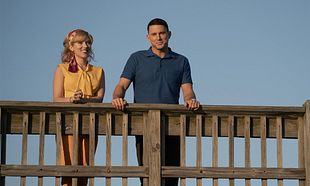Ireland, 1862. A young girl (Kila Lord Cassidy) has allegedly not eaten in almost four months. A committee of village elders (Ciaran Hinds, Brían F. O'Byrne, Dermot Crowley) and a local doctor (Toby Jones) send for a nurse from London (Florence Pugh) to observe the young girl and her family (Niamh Algar, Elaine Cassidy) and ascertain the truth. As she closely watches the young girl, the nurse begins to question what she sees, even though it goes against everything she knows to be true...
With two movies in as many weeks exploring Ireland's dark history, you have to wonder - no pun intended - what the attraction is. 'The Wonder' is focused on the clash of fact and fiction, faith and reason, and lies and truth - not on angry fiddle players or severed limbs. Yet, like that other effort, 'The Wonder' does come to the screen with a certain amount of baggage for everyone watching in this part of the world.
Specifically, an English nurse arriving on this island a few years after a systematic genocide was committed on it with no awareness of it. It might be that it's a pointed blindness on her part, whereas all other Irish characters are deeply aware of it. Yet, for a movie about a child who can survive without food, and thematically is about rejecting superstition and facing facts, it seems curiously mismatched. It's not the only thing about 'The Wonder' that proves itself to be ponderous and brow-furrowing.
The movie opens on a sterile, modern soundstage where Niamh Algar - yes, the actor Niamh Algar - introduces the movie and explains how stories are vital to our existence. Later on, after a scene concludes, Nimah Algar drops her character and looks right down the lens at the audience, reminding them that they're watching an arthouse drama, and not facing reality. 'The Wonder' is also bookended with Niamh Algar appearing again to remind us that, yes, we are watching an arthouse drama. It's an odd choice, distracting and belabouring a point made so clearly in the script and in the direction.
Leaving this aside, 'The Wonder' draws you in with a strong ensemble cast and even-tempered performances from all concerned. Niamh Algar makes for a haunting presence in the story, while the assembled elders are suitably drab and oppressive. Kila Lord Cassidy, who plays the central focus of the story, has such presence and conviction for such a young actor, helped along by her on-screen and real-life mother, Elaine Cassidy. Tom Burke is slightly overstretched as both cynical onlooker and romantic interest, but does it reasonably well. Florence Pugh is, not surprisingly, the star of the show and rightfully so.
In such a short period of time, Pugh has demonstrated an uncanny ability to read and meet the temperature in any scene in any movie or television show while making it look effortless. Moreover, she can completely lose herself in a role and does so here, with a deep and complex inner life of a character that's written so vividly by Emma Donoghue, director Sebastien Leilo and 'Lady Macbeth' scribe Alice Birch. Indeed, Pugh puts on a performance quite similar to 'Lady Macbeth'; all of it woman-on-the-edge-of-sanity stuff and barely keeping it together.
'The Wonder' unfolds in a relatively procedural fashion, culminating with an ending that's just far too neat and tidy for what's preceded it - namely, a complex exploration of faith, fact, reason and ritual. Even in this, 'The Wonder' seems rigid in parts. It's at its best when the atmosphere and the fog-filled scenery rolls in and dwarfs the characters, reminding us how cut-off they all are and how thin the veil between worlds is in places like that. 'The Wonder' isn't for everyone, and certainly will stump some viewers with its flight into pretension at the beginning and end of the proceedings. Yet, it's anchored by strong performances all around - in particular Algar, Lord Cassidy, and Pugh - and this carries it over the weaker moments in the script and the heavy-handed directing.

























































































